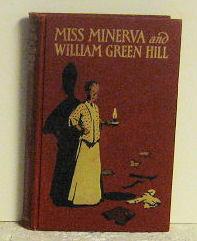Perhaps that is why I have always turned to books when I am down or when I feel stressed. Books surround me and my house is filled with them. One of the oldest books I have is a book titled Miss Minerva and William Green Hill. This book was read to my third grade class by Mrs. Chapman, a gifted teacher who read to us for the last thirty minutes of the day.
When the school year ended, Mrs. Chapman, who knew how much I loved the book and her reading it, let me take the book home so I could finish it over the summer. I am sure Miss Minerva would be banned today because of the language used between the white kid, William Green Hill (Billy) and his friend, a black boy his age. The dialect used through out is difficult to read, and I admire my teacher for doing such a good job with it. I think the author was being true to the culture of our country at the time, the early twentieth century.
The two children loved to be together and played together, got into loads of mischief that brought Miss Minerva, Billy's aunt, down on them with angry words. She preached to Billy, and he responded with words that often made his aunt stop and think. The book will make you smile and laugh but you need to know it is full of stereotypes regarding race.
When I ran across the book in a used book store about twenty years ago, I had to have it. When I opened it and tried to read it, I was amazed at how much dialect was used and how difficult it was to read. I didn't remember it that way.
In writing classes today, we are encouraged not to use heavy dialect in our writing because it often stops the reader who has to go back and try to understand the weird writing. We use only a few phrases or words to indicate the dialect, but it is not acceptable to misspell words or write a sentence with so much dialect the reader must struggle to understand what the author is trying to say.
The Miss Minerva books, and there are several, remind me of the Mark Twain books which also reflected the culture of the time. The author of the first book in the series is Francis Boyd Calhoun. After her passing the books were written by others. I loved the book when I was a child. The reviews of the book tell the same story of kids who were read this book by adults and insist their own children hear it.
Did you read this book when you were a child? Did you have a special book you loved as a child and bought it as an adult?

